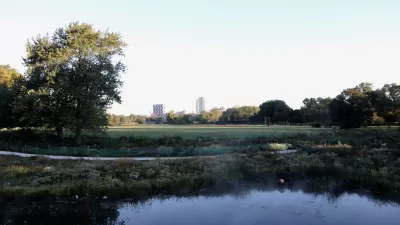The former president's Obama Presidential Center, to be constructed in Chicago's Jackson Park, has faced opposition from nearby residents concerned about its effects on the area.

A committee of Chicago's City Council has approved an agreement laying out how the Obama Foundation can use its Jackson Park site. Lolly Bowean reports, "for the first time, the committee revealed language in the legislation that seeks to protect current homeowners and residents who live closest to the selected site. As part of their agreement, which the panel approved unanimously, the city will monitor property values and other indicators of demographic changes near the center site. If there are dramatic changes, the city will implement measures to keep residents in their homes [...]"
The legislation, however, does not stipulate the exact nature of those measures. Some residents, who have advocated for a community benefits agreement with the Obama Foundation, are "unsatisfied." The full City Council will vote on the agreement on Oct. 31.
Community activists have waged various campaigns to influence the direction of the future Presidential Center. "The new language about property values was the latest in a series of steps the Obama Foundation and city officials have taken to address concerns related to the $500 million development. In January, the foundation scrapped plans for an aboveground parking garage after some community activists opposed it."
See also: First Look at the Future Obama Presidential Center
FULL STORY: Council panel approves agreement with Obama Foundation over use of Jackson Park

Planetizen Federal Action Tracker
A weekly monitor of how Trump’s orders and actions are impacting planners and planning in America.

Maui's Vacation Rental Debate Turns Ugly
Verbal attacks, misinformation campaigns and fistfights plague a high-stakes debate to convert thousands of vacation rentals into long-term housing.

Restaurant Patios Were a Pandemic Win — Why Were They so Hard to Keep?
Social distancing requirements and changes in travel patterns prompted cities to pilot new uses for street and sidewalk space. Then it got complicated.

In California Battle of Housing vs. Environment, Housing Just Won
A new state law significantly limits the power of CEQA, an environmental review law that served as a powerful tool for blocking new development.

Boulder Eliminates Parking Minimums Citywide
Officials estimate the cost of building a single underground parking space at up to $100,000.

Orange County, Florida Adopts Largest US “Sprawl Repair” Code
The ‘Orange Code’ seeks to rectify decades of sprawl-inducing, car-oriented development.
Urban Design for Planners 1: Software Tools
This six-course series explores essential urban design concepts using open source software and equips planners with the tools they need to participate fully in the urban design process.
Planning for Universal Design
Learn the tools for implementing Universal Design in planning regulations.
Heyer Gruel & Associates PA
JM Goldson LLC
Custer County Colorado
City of Camden Redevelopment Agency
City of Astoria
Transportation Research & Education Center (TREC) at Portland State University
Jefferson Parish Government
Camden Redevelopment Agency
City of Claremont




























